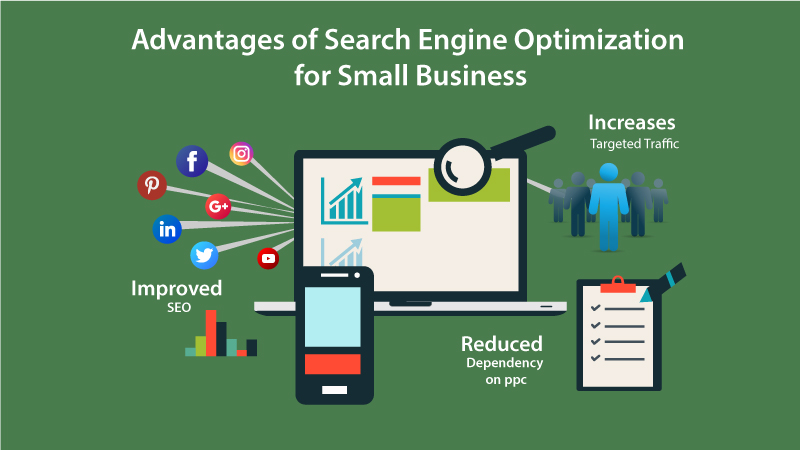
Introduction
Search Engine Optimization (SEO) is becoming increasingly necessary for companies of all sizes. However, many small businesses feel that investing in SEO is a luxury that they can’t afford. As a small business are you in a similar dilemma and wondering?
- How much should I be investing in digital marketing?
- Where should I be spending my limited digital marketing budget?
- Should I be spending any money on SEO?
- What will be the ROI on my digital marketing spend?
- I have tried SEO earlier. Nothing happened. I don’t think SEO is relevant for small businesses.
If you have been thinking on these lines, you are not alone. The good news is you have come to the right place. In this article, we will focus on the question, “Why is SEO important for small businesses”? We will discuss the following:
- What is SEO?
- Benefits of SEO
- Why is SEO important for small businesses?
- SEO tips for small businesses
While SEO is very important for all businesses, for small businesses, it is one of the most important digital marketing tools. Let us understand why. But before we come to that, what is SEO?
What is SEO?
Search Engine Optimization (SEO) is the key to making your business visible and searchable for your target audience. SEO is the process of optimizing your website to help it rank higher in search engine results.
There are several benefits of SEO for all businesses.
Benefits of SEO
The key benefits of SEO are briefly discussed as follows.
- Increase Visibility: If you wish to attract more customers to your business, the first step is to ensure that they can easily find you. SEO helps your business to rank higher in search results. The higher you rank the more traffic you are likely to receive. 75% of the users are unlikely to scroll past the first page of the search results.
- Drive Organic Traffic: SEO is the most important driver for organic (free) traffic. Organic traffic is important for the following reasons:
- More than 50% of all website traffic comes from organic search.
- Ranking high in organic search results is important since over 70% of users ignore paid advertisements.
- Search engines drive 300% more traffic to websites than social media.
- Inbound leads, such as SEO, cost 60% less than outbound leads, such as direct mail or cold calling. Also, SEO leads have almost 15% conversion rates compared to around 2% for outbound leads such as print advertisements.
- Build Brand Credibility: Focusing on SEO as an ongoing strategy will help your business to build credibility. As you focus on creating quality content for your users, search engines will begin to trust your website. They will also start recognizing your company as an authoritative source.
- Strong User Intent: Customers who come to your website through an organic search already have a strong intent to buy. This has already been demonstrated through the search query. These customers have a higher conversion rate.
- Keep Up With Competition: If businesses do not use SEO as a marketing strategy, they are in danger of missing out on potential leads. These leads will go to their competitors. This means that if your competition is investing in SEO, you too need to do this.
- A Long-Term Investment: SEO is not just a marketing expense. When done properly, SEO is an excellent long-term investment for your business. Creating great content for your website is building your digital assets and will yield results for years to come.
Let us next take a look at some of the specific benefits of SEO for small businesses.
Why is SEO important for small businesses?
SEO is specifically important for small businesses for the following reasons.
- Improve Visibility: For small businesses, SEO is one of the best tools for getting visibility and building brand awareness. If users find your business being ranked on the first page of SERP (search engine results page), they are more likely to consider your brand. For small businesses, this is vital. SEO can help small businesses to grow faster by bypassing competition.
- Improve Local Visibility: Most consumers use Google to search for products and services near them. Check-out the following statistics in this regard.
- Almost half of Google searches include location.
- Even when users are searching for products and services locally, they first use Google.
- Over 70% of consumers who search local businesses online end up visiting stores within a five miles radius.
- Nearly one third of all Google searches end in a purchase.
- “Near Me” searches have increased almost 500% in recent years.
Clearly, local SEO can improve the visibility for a small business, focusing on local customers. Even if your business model is primarily based on sales from your physical store, SEO will help in driving in-store traffic and purchases. An increasing number of consumers are conducting online research before making their purchase decision and visiting the store.
- Make Website User-Friendly: SEO will make your website faster and provide a better user experience. By making your website more convenient and useful for users, you will increase the traffic and probability of making a sale.
- Find New Customers: Small businesses that have a website grow twice as fast as those who don’t have an online presence. By significantly improving the quality of your website, SEO can accelerate the growth for small businesses.
- Compete with Larger Players: The distinction between marketing and digital marketing is increasingly getting blurred. This presents a wonderful opportunity for small businesses to compete with their larger counterparts. As a small business, you are unlikely to have the marketing resources and paid ad budgets of larger organizations. But, you can use SEO and great content to ensure that you have a fantastic website that provides an amazing user experience to your website visitors. You might not have the resources to compete with larger companies in terms of the physical infrastructure. But you can still ensure that you have an excellent online presence with very high ranking in search results.
- Cost Effectiveness & High ROI: SEO is among the most cost effective and high ROI marketing activities for small businesses. It is relatively inexpensive to implement as compared to paid ads. Pay Per Click (PPC) advertising can be very effective for getting new customers. However, small businesses usually cannot afford this. This makes SEO particularly attractive for small businesses that might have budgetary constraints. Also, the organic traffic, driven by strong user intent, has a better conversion rate. Moreover, the impact of online ads will last only as long as you keep on investing. On the other hand, any investment on SEO will have a long-term impact and will continue to bring in customers for years to come. Due to this, the ROI of SEO is among the best.
- Become a Global Player: In this age of e-commerce and online sales, a sound SEO strategy can provide a level playing field to all companies big or small. This provides a unique opportunity for small businesses to grow regionally, nationally and even internationally.
We will next discuss some SEO techniques for small businesses.
SEO Tips for Small Businesses
Having understood the importance of SEO, you decide to join the game. You are likely to soon encounter another challenge. You will find that larger companies with bigger digital marketing budgets have already acquired a significant share of the online traffic. They also enjoy the top rankings for your desired keywords. These larger companies have websites with very high domain authority. You are unlikely to be able to compete with them. You don’t need to fight with these giants. Instead, you will need to take a different approach. One that is more suited for your small business. Some of these SEO techniques for small businesses are listed below.
- Target Keywords That Others Aren’t: As a small business website, you need to target keywords that are underserved. Around 15% of all Google searches are new. These are search queries that Google has not seen before. This is information that users are searching for. However, these topics are not being covered adequately. These keywords have low competition, low traffic and low keyword difficulty. It is likely that these are long-tail keywords. By targeting these keywords, your website will get noticed by Google.
- Be Aggressive in Link Building: You need to be extremely aggressive in link building. This will help you to build authority for your website. For small businesses, guest posting can be a very effective approach for link building.
- Google Business Profile: This is a free tool that allows small business owners (and nonprofits) to promote their business information on Google Search and Maps. Ensure that you have a Google Business Profile page and it is always updated with accurate information regarding your business.
- Extreme Focus on User Intent: While this is important for all businesses, this is vital for small businesses. Larger companies can afford to cast their net wide and catch a lot of unqualified traffic. But as a small business with limited resources, you need to narrow your search and try to get extremely qualified traffic. This traffic will have a higher conversion rate.
- Share Customer Stories: Create content focusing on your actual experience with customers from enquiry to sales. Share such stories about actual engagement with customers on your website as well as on social media.
- Mobile-Friendly Website: In the US, over 60% of searches on Google is done using a mobile device. This means that your website needs to be mobile responsive so that you ensure a great user experience.
- Separate Landing Pages for Each Location: If your business has multiple locations and you are primarily focusing on local customers, create separate web pages for each location. However, if you are using the same template for the various landing pages, use different primary keywords. This will help you to avoid the risk of duplicate content. You don’t want Google to think that you are spamming.
- Get Customer Reviews: Encourage customers to leave reviews. This can be a source of valuable information for a potential customer to make a purchase decision. Customer reviews provide a great validation for any business. However, they can be vital for small businesses focusing on local consumers who are searching for products and services on Google using “near me”.
In Conclusion
One of the biggest roadblocks for small businesses that are unfamiliar with SEO is commitment. After all, it is not easy for small businesses with limited resources to patiently wait for 6 months to see the impact of their SEO investments. SEO is not the quickest ROI dollars. But it is among the most effective. Luckily, even small businesses can find ways to succeed and even outrank much larger competitors. In the end, it’s all about having the right SEO strategy and investing the required time and effort to provide your business a competitive edge.
If you are interested in knowing more about the basics of SEO, you can refer to our earlier blog post on The Ultimate Beginner’s Guide to SEO.
To learn more about digital marketing read here.
Other References
Trust you have enjoyed this article on “Why is SEO important for small businesses?” If you are keen to learn more about this topic, you can refer to the following articles.
- The Importance of SEO for Small Businesses
- 15 Reasons Why Your Business Absolutely Needs SEO
- 5 KEY Benefits of SEO for Small Businesses
- 5 Reasons Why Small Businesses Need SEO
- The Benefits of SEO for Small Businesses
